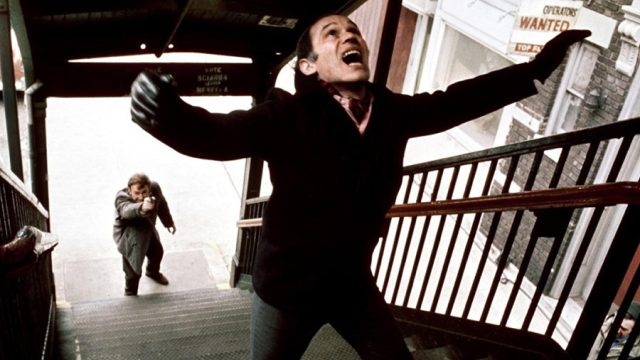This Week You Will Hurry to Catch:
- six seconds of a Friedkin classic
- evidence of bad philosophy
- stunning costumes
- elevated animation
- “reality!”
Big thanks to scb0212 and Miller for connecting us with these pieces. Send articles to ploughmanplods [at] gmail through the next week, post articles from the past week below for discussion, and Have a Happy Friday!
At The Reveal, Keith Phipps weighs in on a controversial edit to the streaming version of The French Connection:
That’s partly because it’s so clumsily done, introducing a jerky cut into what’s otherwise a beautifully edited film. (Gerald Greenberg even took home an Oscar for his work.) But it’s mostly because the moment is key to understanding Doyle and the tension at the heart of the film, which asks viewers to stay side-by-side with a character they know to be deeply morally flawed on an obsessive and violent quest to take down an international drug ring. Whatever good he might be doing, Doyle is not a good person. And, more specifically, he’s racist.
Staying on the altered history front for a moment, Richard Wolin writes in The Los Angeles Review of Books about the concerted effort to erase the antisemitism in the work of influential philosopher Martin Heidegger:
The controversies that have haunted the publication of Heidegger’s work are significant, insofar as they concern not merely occasional and understandable editorial lapses but instead suggest a premeditated policy of substantive editorial cleansing: a strategy whose goal was to systematically and deliberately excise Heidegger’s pro-Nazi sentiments and convictions. As Heidegger scholar Otto Pöggeler observed appositely, “Heidegger is like a fox who sweeps away his traces with his tail.”
Phoebe Chen surveys Anita Mui’s costumes and styles in Metrograph:
Mui’s Wonder Woman disguise [in The Heroic Trio] is a mix of comic book Americana’s functional, limb-hugging leather and a billowing wuxia robe—deep purple like the cover of Bad Girl—its floor-length sleeves a reminder that any master of choreographed movement has first conquered earthly physics. Her mask is neither flimsy, spandex camp nor the matte black, high-tech seriousness of recent superhero reboots, just a plain, silver shroud that flirts with the light. But it seems to register and not conceal, the shifting imprints of her expressions, its metallic surface hewing to every contour of her face, as if cast in molten steel that never quite set. Like so many stars who have cleaved their private selves from the public phantasmagoria of their likeness, Mui often spoke of a desire to “take off the mask,” though I suspect she knew, as do all who love her, that something true enough still came through.
Vulture’s Matt Zoller Seitz talks to animator Genndy Tartakovsky about his career and new series:
All storytelling is mystery. Even when you’re doing something that’s mainly comedy or action, you’re still telling a mystery, in a way. The audience will fit all the pieces of the story together. And you know, this could be a fault! I finished this show and I wondered if it was too much, especially coming off Primal, which is the ultimate in simplicity. This one is complex, with the storytelling and everything unfolding — and where it goes, it grows. There are plot twists and a lot of other stuff that I am generally not a fan of but that I felt needed to be there for this one. But I still want to try to give the audience the minimum amount of information that’s needed to draw them in.
For The Yale Review, Percival Everett considers abstraction and “reality” in fiction:
Were you, with your best friend—and I’ll add that you are both fine actors—to memorize some great passage of dialogue, contemporary dialogue that one could imagine in our time, from a novel or story, or even from the stage or screen, and get on a local train or bus and act out that dialogue, people would think you odd. At best they might take you for non-native speakers, but, more than likely, they will think you are crazy. Conversely, if you were to transcribe the best of your favorite conversations with your dearest friend it would read as terrible dialogue. It would sound “unreal.” But your conversation was real, wasn’t it? Of course it was, but it is not the real that will satisfy in fiction.

